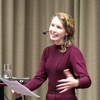stocks
Equalization through Deterioration: The Shrinking Gender Gap in Swedish School Grades
Sociological Science Abstract This article documents a surprising reversal in the long-standing gender gap in academic achievement: between 2021 and 2024, Swedish girls’ school grades declined sharply,

Reducing populations' vulnerabilities to mis-disinformation related to scientific content
The purpose of this project is to develop evidence-based strategies to address populations’ vulnerabilities to scientific mis-disinformation.
Hanna Wass: Too much of a good thing? The future of the antifragile democracy
Hanna Wass is an Academy Research Fellow and University Lecturer in the Department of Political and Economic Studies at the University of Helsinki. ABSTRACT As a potentially antifragile system, the stre
Katie Steele: Neutrality about creating good lives - No panacea for longtermism
Place: At the Institute for Futures Studies, Holländargatan 13, Stockholm, or online.REGISTERAbstractThe principle of neutrality can be seen as a direct response to the totalistapproach to evaluating popu

Katie Steele: Neutrality About Creating Good Lives - No Panacea For Longtermism
The principle of neutrality can be seen as a direct response to the totalist approach to evaluating populations of varying constitution and size: while the latter holds that the addition of a good lif
From Categories to Categorization: A Social Perspective on Market Categorization
Research in the Sociology of Organizations, Volume 51, 2017 Abstract The popularity of research into categories has grown in recent decades and shows no sign of abating. This introductory article takes
Rod Rhodes: The theory and practice of governance: the next steps
Rod Rhodes is Professor of Government (Research) within Social Sciences at the University of Southampton.ABSTRACTIn the 2000s, the New Public Governance (NPG) became prominent and this article takes s
Multistakeholder Partnerships for Sustainable Development: Promises and Pitfalls
Annual Review of Environment and Resources, vol. 49 Abstract This review examines the promises and pitfalls of multistakeholder partnerships (MSPs) for sustainable development. We take stock of the lite
Karin Bäckstrand: The Role of Non-state Actors in Global Climate Governance after COP22 in Marrakech
Professor in Environmental Social Science, Stockholm University ABSTRACTWhat is the roles of non-state actors, such as civil society, business, indigenous movements and cities, in global climate and th Conference of the Parties (COP15) in Copenhagen to COP22 in Marrakech, where Marrakech Global Climate Action was launched involving voluntary climate action commitments from more than 12 000 companies, investors, cities and regions, and civil society actors. Over this timeframe, we have seen a form of ‘hybrid multilateralism’ emerge, in which UN climate diplomacy blurs state and non-state participation in complex and intriguing ways with implications for the authority, legitimacy, and effectiveness of climate governance. This speaks, in different ways, to the transformed landscape of climate cooperation with a strengthened interface of multilateral climate diplomacy and non-state climate action and the potential roles, modes, and effects of non-state actors in the post-Paris period.
Erik Olin Wright: Pathways to a Cooperative Market Economy
Erik Olin Wright: Professor, Department of Sociology, University of Madison-Wisconsin. ABSTRACT The idea that there is a pathway from a capitalist economy to a cooperative market economy is grounded in








